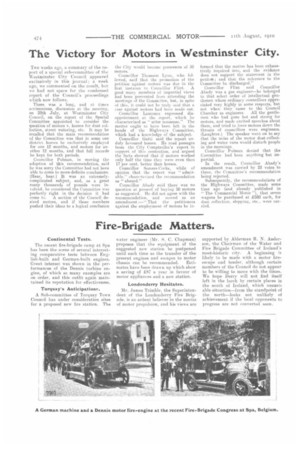The Victory for Motors in Westminster City.
Page 12

If you've noticed an error in this article please click here to report it so we can fix it.
Two weeks ago, a summary of the report of a special sub-committee of the Westminster City Council appeared exclusively in this journal ; a week ago, we commented on the result, but we had not space for the condensed report of the Councils proceedings which now follows.
There was a long, and at times acrimonious, discussion at the meeting, on 28th July, at. Westminster City Council, on the report of the Special Committee appointed to consider the question of motors v. horses for dust colled-ion, Street street watering, etc. It may be recalled that the main recommendation of the Committee was that in some one district horses be exclusively employed for one 12 months, and motors for another 12 months, and that full records be kept, for both periods.
Councillor Pulman, in moving the adoption of this recommendation, said he was sorry the Committee had not been able to come to more-definite conclusions, (Hear, hear.) It was an extremelycomplicated subject, and, as a great many thousands of pounds were involved. he considered the Committee was perfectly right in the decision it had come to. A section of the Council desired motors, and if those members pushed their ideas to a logical conclusion
the City would become possessors of 50 motors.
Councillor Thomson Lyon, who followed, said that the promotion of the petition against motors was due in the first instance to Councillor Flint. A good many members of impartial views had been prevented from attending the meetings of the Committee, but, in spite of this, it could not be truly said that a case against motors had been made out.
Councillor Laurence expressed disappointment at. the report, which he characterized as " utter nonsense." The matter ought to have been left in the hands of the Highways Committee, which had a knowledge of the subject.
Councillor Gatti said the report unduly favoured horses. He read passages from the City Comptroller's report in support of this contention, and argued the facts showed that if motors worked only half the time they were even then 17 per cent. better than horses.
Councillor Somers-Cocks, while of opinion that the report was " charaeterized the recommendation as " absurd."
Councillor Abady said there was no question at present of buying 50 motors as suggested. He did not agree with the recommendation, and moved as an amendment :—" That the petitioners against the employment of motors be in
formed that the matter has been exhaustively inquired into, and the evidence does not support the statement in the petiton; and that the reference to the Committee be discharged."
Councillor Flint said Councillor Abady was a gas engineer—he belonged to that select order of intellectual gentlemen whom ordinary councillors appreciated very highly in some respects, but not when they came to the Council Chamber as engineers. All the gentlemen who had gone hot and strong for motors, and made excited speeches about them, and tried to force motors down the throats of councillors were engineers. (Laughter.) The speaker went on to say that the noise of the motor dust-collecting and water vans would disturb people in the mornings.
Councillor Pulman denied that the Committee had been anything but impartial. In the result, Councillor Abady's amendment was carried by 28 votes to three, the Committee's recommendation being rejected. Subsequently, the recommendations of the Highways Committee, made some time ago (and already published in " The Commercial Motor "1, that seven wagons be purchased at £580 each, for dust collection, slopping, etc., were carried.




















